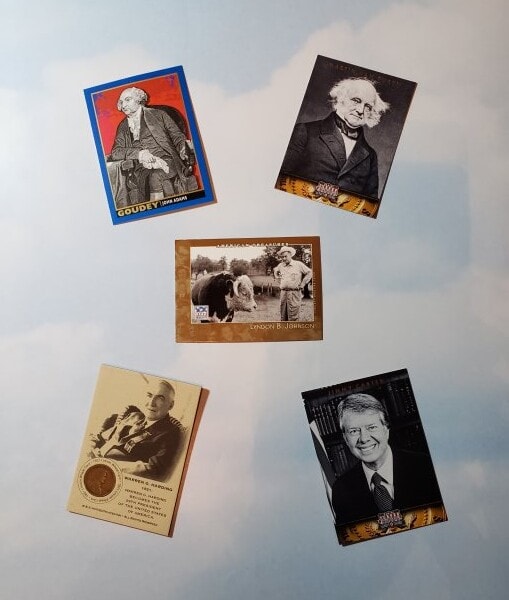Troublemaker
I think if each one of us was really to think about it, we could come up with someone in our lives that really inspires us. Some of those people are no longer with us. From a Presidential standpoint, Abraham Lincoln might be one of those inspirational people. Some of these inspirational people are still alive but we might not actually know them. To me, someone like Max Lucado, Charles Swindoll or Charles Stanley might fit that bill.
Then we have those people from our past that have inspired us. In my personal life I could name people like Bonnie Davis and Gleaton Rickenbaker. Of course, most of us, when we think of inspiration, think of our parents. Then we have had those old friends who let us be ourselves, or we could talk to about anything, or when we were down they always knew how to help lift us up.
Then in life, God surprises us with those people who step into our lives and almost, by accident, they inspire us, too. We don’t plan for them to inspire us. Sometimes they just come along with the territory we travel. Then one day we look up and we are literally looking up to them.
One of those surprise people to me is my Father-In-Law. It’s not that my Father-In-Law needs anymore fans. He has made quite a name for himself. To me, it is more the way he lives and the insight into things that inspires me.
My Father-In-Law has a heart of gold and there is no place where that shines brighter than his love for his family. Not only does he love being with his family, he also would do almost anything for its members. Every year he rents a beach house in the Outer Banks of North Carolina so all his family can gather together and just have a good time. This might be the only vacation some of them get for the entire year.
Where I believe my Father-In-Law really shines, though, is with his passion. If you get him off on a topic that he has passion for, you can just see it in his eyes and hear it in his voice. It’s not a vindictive type of passion, but a heartfelt passion.
Nowhere does that passion my Father-In-Law shows, shine through more than for the cause of the mentally disabled. I’m sure this is a passion that came over time because of his son Chuck, who has down syndrome.
Chuck was born the year before I was. I tease him by telling him he is my older Brother-In-Law. Chuck can’t wait until my birthday because, at least for a little while, we are the “same” age. Everyone loves Chuck and a large part of that has to do with the fact that my Father-In-Law and my Mother-In-Law have raised and loved him into the person he is.
Things weren’t always the way they are as far as down syndrome goes. My Father-In-Law has told me that when Chuck was born, the “normal” procedure was to commit those children to mental wards. After all, there really wasn’t anything you can do for them, right? That attitude was not acceptable to my Father-In-Law and my Mother-In-Law and they decided to raise their child just like they would any other child.
With that said, as much as they wanted to raise Chuck as just another child, there were challenges that made him different and required different approaches. Since there weren’t many “services” to help individuals like Chuck, his parents set out to form and join groups of like parents to work together to help each other.
Before you knew it my Father-In-Law became a full blown advocate for that cause. He was speaking to state and local representatives to fund more programs to help with that cause. He was also part of and he helped form groups to help support this cause.
Then the issue came up with what to do with these individuals if the parents were no longer able to care for them. The idea of group homes was formed. In these homes several disadvantaged individuals would live with a caretaker. The homes would be in the center of communities so they could just slide into society.
The biggest hurdle they had to overcome was that neighborhoods didn’t want “those folks” as neighbors. They couldn’t understand why “troublemakers” like my Father-In-Law wanted to disturb their neighborhoods.
Lawsuits were the next avenue that were traveled down. Justice stated that neighborhoods had no right to keep “those folks” out of their neighborhoods based on their fears of what type of neighbors “those folks” might be. Eventually, after these group homes settled into those neighborhoods, the neighbors found that they had excellent neighbors and most even started enjoying the residents.
Chances are you have never heard of Gene Williams before. I did an online search and I couldn’t find anything about this Gene Williams. But Gene Williams was one of those troublemakers who has hidden behind some of the super stars in the cause he helped start. I doubt he ever had any idea that he was even causing any trouble.
Gene was a driver. He actually drove the car for a senator when that senator would come home during his breaks. Gene was married to Helen, who cooked for the senator. Although the senator was known as a very tough cookie, he seemed to have taken an interest in Gene and his family.
Unlike others who worked for him, the senator would often start conversations with Gene. The senator would also let Gene bring his wife, Helen, along on some of the trips. Who knows what they talked about, but in one conversation they did have with the senator, the senator would later repeat it over and over again because it really touched his heart.
On one of their trips the senator suggested to Gene that he should bring his dog with him. The senator loved animals, especially dogs. Gene replied, “A Negro has enough trouble getting through the South without a damn dog.”
The senator was completely puzzled by his words and he asked him to explain. Gene continued, “We drive all day, but when we want to go to the bathroom just like you all do, we have to go out a side road and our women have to get behind a tree, because we can’t go into a filling station like you do. We get hungry and we’ve got to eat just like you do, but we have to go across the tracks to a grocery store and get some cheese and crackers because we can’t go into a café. Or if some hamburger stand would take a chance on being insulted, we have to go around to the back and wait till everybody else is served to get something to eat. We drive hard all day long, and it comes to ten or eleven o’clock and Helen and I want to go to sleep. We can’t go into a motel or a hotel. We have to drive across the tracks and find some boarding house way down there where they’ll take us in for the night, because we’re not allowed in the hotels or motels. But you’re not allowed in any place, even across the tracks, if you’ve got a damn dog with you.”
This Bible character was one of a group of seven individuals. After Jesus’ death, the Christian movement was formed. The Word of God was now available to the Gentiles, too. While this sounds like a wonderful advancement, it also presented some problems.
Before Jesus’ birth there were only Jews who were parts of God’s blessings, at least in the Jewish frame of mind. When Jesus reached out to the Gentiles, He pulled them into that blessing as well. The established Jews were none too fond of this idea. Jesus seemed to have all the “right” answers to the Gentile involvement in the faith.
When Jesus died on the cross, arose, and then ascended into heaven once again, His audible voice was no longer around to offer that wisdom. It was now up to the disciples to interpret those “tricky” theology questions.
One of the first test to the disciples came in the form of a complaint from the Greek sect of the new faith. They were complaining that their widows and poor were being overlooked in the food and charity handouts the church was giving. To resolve this challenge, the disciples appointed these seven Greek deacons to work out a solution. Our Bible character was one of those seven.
Our Bible character was filled with wisdom and he was able to perform wonders and miracles. This made the established Jewish church very nervous. Those religious leaders decided to bring false witnesses to charge this troublemaker with blasphemy.
This charge excited their congregation and they would settle for nothing less than his execution. The problem was they were under Roman rule and had no real authority to issue a death sentence.
One of the most effective Senate Majority Leaders in our history was Lyndon Johnson. He perfected his skills of negotiating and arm twisting. He took that knowledge he gained with him into his Presidency. Whether you liked him or not, he got things done.
Johnson was extremely touched by his conversation with his driver Gene Williams. He would tell the story over and over again and often had to hold back his emotions. It would lead to his push for the Civil Rights Act of 1964 during his Presidency.
Johnson also understood that as long as African-Americans and other minorities were restricted to access of the ballot box, their voices would never truly be heard. In states like Alabama, Mississippi, Louisiana, and South Carolina they were even denied the right to vote.
Two civil rights groups, the Southern Christian Leadership Council (SCLC) and the Student Nonviolent Coordinating Committee (SNCC), were forming at this time. Johnson had developed a really good relationship with one of its members, a man named Martin Luther King, Jr.
Johnson met up with King and suggested that the average American was really unaware of how really bad the injustice was. He told King that he thought if the average American could see that injustice actually on display, their hearts would break and they would demand that things should change.
Johnson told King to find the absolute worst place in America where that injustice was on display and “get it on the radio, get it on television, get it in the pulpits.” King went to work and King found a place where only one percent of eligible black voters was registered. King then got with the leaders of SCLC and SNCC and organized a march.
The place for the march? Selma, Alabama. Governor Wallace ordered the Alabama state troopers to fire tear gas on the demonstrators and the officers also started attacking the demonstrators with billy clubs. The whole thing was captured on television. Just like Johnson predicted, the civil rights movement was born.
When the Sanhedrin brought our Bible character in front of the High Priest, the High Priest asked, “What do you say about these charges?” Our troublemaker rambles on for almost fifty verses explaining the Jewish history. He talked about Abraham. He talked about Moses. He talked about David. He talked about Solomon. He talked about the Exodus. He talked about the Temple. I guess it was his way of saying, “Hey guys, I get it. I know where this faith has come from. I know the meaning of our religion.”
But when Stephen gets to the end of his speech, his story turns toward the prophet Isaiah. He quotes him with a question God was probably asking in Isaiah’s time. The question was basically, “What is a temple anyway? Wasn’t it I who gave you the materials to build it? Do you think that it can contain me?”
Then Stephen turns the conversation personal. He tells the Sanhedrin that they are as stubborn and bull headed as those folks that Isaiah was talking to. In fact, he would continue, they have always mistreated the prophets God had sent to them.
You talk about something turning a crowd against you. Picking on their spiritual authority was one of the most evil things you could do. The crowd cried for death. When hesitation ruled they formed a mob and dragged Stephen outside and stoned him to death.
When social justice forgets the mentally disadvantaged, we need troublemakers like my Father-In-Law who speaks up for them. When social justice is based on the color of one’s skin, we need troublemakers who are willing to speak out like Gene Williams. When social justice threatens your religious values, we need troublemakers like Stephen who are willing to stand there and have stones thrown at them.
Unfortunately, the world can sometimes be a very ugly place. Today, more than ever, everyone one seems to be worried about their personal rights. Our hearts seem to be focused on nothing more than our reflections. We forget that conquering the world gains you nothing after you breathe your last breath. No, our rewards will not be based on those worldly things, but rather on those spiritual things that make the world think of us as troublemakers.
Prayer: Dear Mighty Father, Help me be one of Your troublemakers. Grant me the strength and courage to stand up to injustice when I see it. Amen.




Hi Wayne,
Thanks for the nice thoughts. I never considered my self to be an inspiration. I have been so blessed to even be a part of some of the things you mention. As I look around me and around the world , I have to wonder why has God been so good to America and our family. As Billy Graham who reminded us, God loves us so much and we are inspired to show His love to our neighbor. Hopefully we can always show such love!!